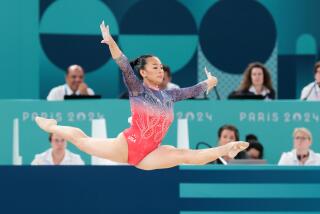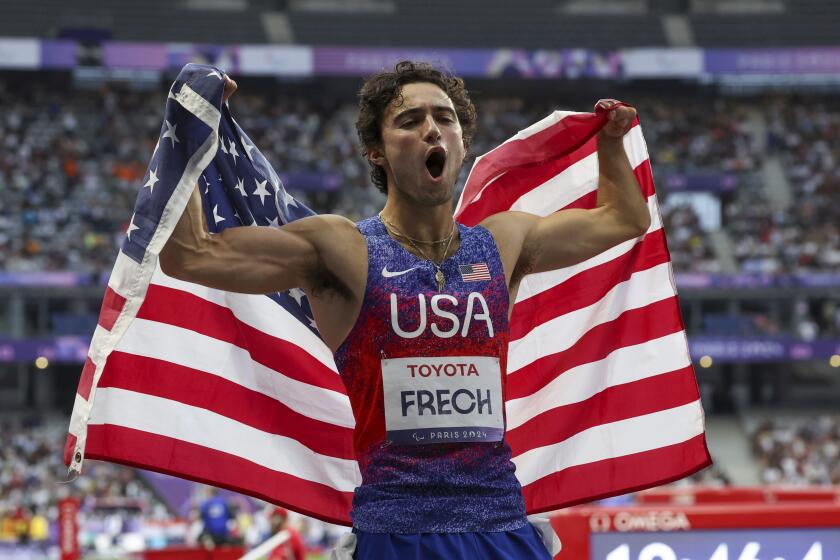Korbut Is Back on the Beam : Gymnastics: She raised a son and raised questions about the Soviet system, but she’s still touring at 34.
It all seemed so simple for Olga Korbut in 1972. Only 17, Korbut caught gymnastics judges off balance at the Olympic Games in Munich with a combination of peril and pigtails. She won individual gold medals in the floor exercise and balance beam, and helped the Soviet Union to a gold in the team competition.
But after fading at the 1976 Games and her retirement a year later, Korbut settled down with her family in Minsk.
And she found life without gymnastics wasn’t easy.
She recently criticized the Soviet Union, saying that the government treated her like a beggar after she retired and refused to allow her to capitalize on her success.
“I can’t hide certain facts,” said Korbut, who trains young gymnasts in Minsk. “But it’s difficult to explain. It’s almost like I didn’t accomplish enough. I felt like I wasn’t needed anymore. It’s the scariest thing for an athlete to go through, in any country.”
Although the pigtails and Olympic cheers are gone, Korbut’s love for gymnastics is not. At 34, she still trains and will be part of an eight-city U.S. exhibition tour, along with Mary Lou Retton and 18 other gymnasts. The tour, her first in the U.S. since 1976, will be at the Forum on Nov. 12.
“I want to be an ambassador of good will as well as an ambassador of gymnastics,” she said though an interpreter. “I hope this role will increase as time goes by.”
Korbut said she was frustrated when the Soviets would not allow her to travel after retirement.
“I didn’t expect to be fussed over, but they could have invited me to the national championships or sent me on tour abroad with the national team,” she said.
Korbut said the impending tour is one of several things she has wanted to do since retiring.
She also wants to open a gymnastics school in the United States, possibly in Southern California. She said she would live in Minsk, and periodically travel to the States to work with the school.
“They’re realistic, yet very initial plans,” Korbut said. “I hope at the end of the tour I will be able to make some decisions.”
Korbut also plans to write a book about her post-Olympic years. Her first book, entitled “There Once Lived a Girl,” was “dedicated to the little girl in me.”
“The second book will expose the other side of the medal, me as a mature person,” she said. “During my childhood I was introduced and exposed to this sport. Then, all of a sudden, it was gone. I had to start over again.
“It’s something every athlete has gone through. There might be a need for a support group for former athletes. Not so much for financial help, but professional training, to help them get into coaching or something else.”
Korbut’s setbacks started at the 1976 Olympics. She helped the Soviets to a team gold, but placed fifth in the all-around and was overshadowed by Nadia Comaneci of Romania.
Her teammates and coaches, many jealous of her success in Munich, criticized her. Two former friends and gymnasts stole her trophies, medals and souvenirs from the family home on her wedding day.
Korbut said it was her husband, Soviet rock star Leonid Bortkevich, and son Richard, 10, who helped her through her her post-Olympic crisis.
“Leonid made it much smoother,” she said. “When I had to cry, he was there. There have been a lot of tears for Olga. It was a really rough time, but it gladdens my heart to know he was there.”
With her problems behind her, Korbut said she is excited about returning to the United States. She first toured the United States in 1973, performing to sold-out houses and even getting a red carpet welcome at the White House from then-President Richard Nixon. She was back again after the 1976 Olympics.
The new tour has inspired her to continue training.
“It hasn’t been very easy for me (to keep training),” Korbut said. “It would have been much easier to say no and quit. But I truly love performing, and I want to show everyone that life, and this sport, is beautiful.
“My performance certainly will remind people of my past ones. But I’m better, more mature, than I was.”
Korbut said she’s looking forward to touring with Retton, who won the Olympic all-around gold in 1984. She has met Retton briefly, but has never performed with her.
“I see in (Retton) a girl who envied my gymnastics style, but in a good way,” Korbut said. “I hope that in 17 years, she will be remembered in the same way I am now.”
More to Read
Go beyond the scoreboard
Get the latest on L.A.'s teams in the daily Sports Report newsletter.
You may occasionally receive promotional content from the Los Angeles Times.









